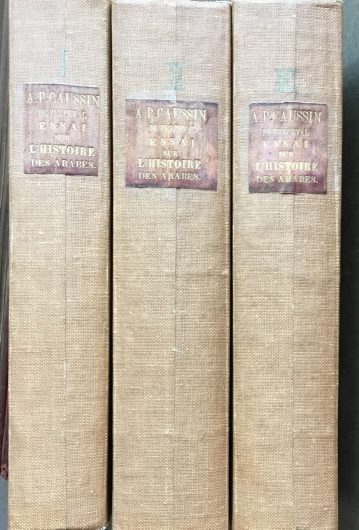Essai sur L’Histoire des Arabes avant l’Islamisme, pendant l’Epoque de Mahomet, et Jusqu’a la reduction de toute les Tribus sous la loi Musulmane. THREE VOLUMES.
Caussin de Perceval, Armand Pierre (1795-1871).
Synopsis
RARE. Only 200 copies were printed from this edition. Armand-Pierre Caussin de Perceval (1759-1835), a French Orientalist, was professor of Arabic in the College de France. In 1814 he went to Constantinople as a student interpreter, and afterwards travelled to Syria and Lebanon, spending a year in Lebanon, and finally becoming dragoman in Aleppo. He published several works covering the Arabic language and traditions.
His great reputation rests almost entirely in this work, in which the native traditions as to the early history of the Arabs, down to the death of the Prophet and the complete subjection of all the tribes to Islam, are brought together with wonderful effort and set forth with much knowledge and lucidity. One of the principal manuscript sources used by Caussin de Perceval in this work is that (the Book of Songs) of Abu Faraj, which was later published in 20 volumes in Boulaq (1868) in Egypt; but no publication of texts can deprive the Essai, which is now very rare, of its value as a trustworthy guide through a tangled mass of tradition.
In these three volumes the author traced the history of the Arabian tribes and States, from the earliest glimmerings of Islamic tradition, to the period when the whole area was united under the banner of Islam. Through the multitudinous and often discrepant genealogies, and accounts of individuals and of tribes, he has collated the several steps of various lines, noting at what point they meet, and where the tradition of events disproves or corroborates the tradition of names. The result of his investigations is exhibited with great ingenuity and clearness, in fifteen tables or genealogical trees, in which the descent of the chief tribes and most famous personages or the Peninsula is traced up, with the approximate era of each generation, to the most remote period for which tradition furnishes authority.






